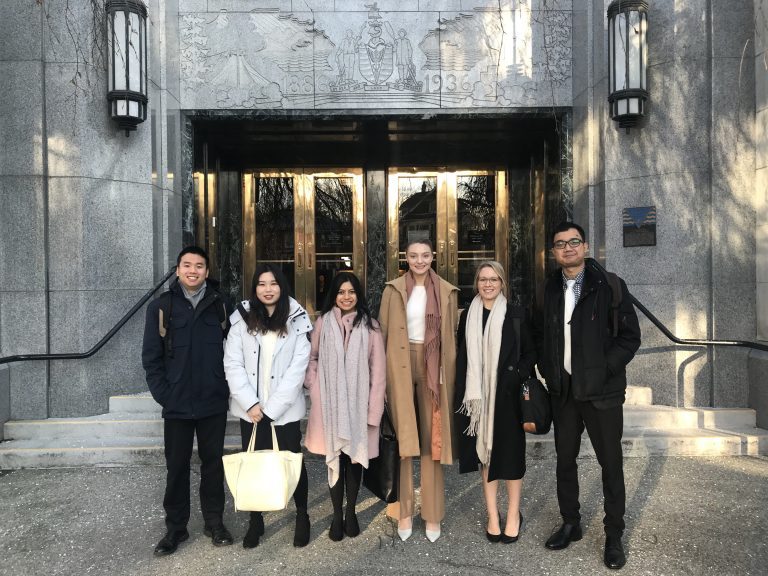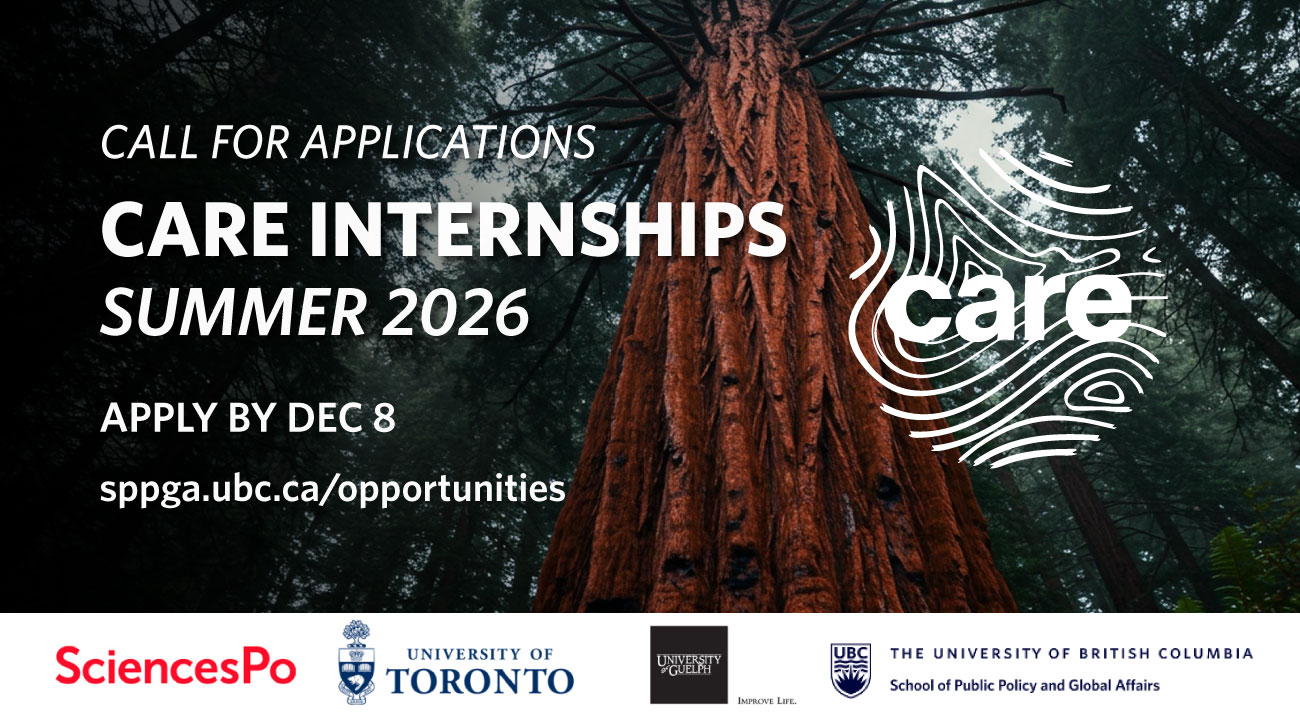

Caption: MPPGA Student Global Policy Project Team from left to right – Sean Wu, Yi Yang, Shivangi Khanna, Schyler Edmundson, Alexandra Martin, and Nikki Wirawan
A team of Master of Public Policy and Global Affairs (MPPGA) students at the University of British Columbia published a reflection of their immersive Global Policy Project that took place in 2019 and 2020 with their client, the City of Vancouver – Planning, Urban Design and Sustainability Department. Read the reflection below:
Global Public Policy Project Reflection: Applying an Equity Lens with the City of Vancouver
With over 1200 jurisdictions worldwide declaring a climate emergency in 2019, climate action has become a top priority for most policymakers as research has warned that the world must keep global warming below 2°C and as close to 1.5°C as possible. However, an often undiscussed aspect of climate action is climate equity, a concept ensuring that no demographic, especially vulnerable ones known as equity-seeking groups, will be left behind during the transition to more sustainable infrastructures. How will low-income households afford retrofits for more sustainable homes or electric vehicles? How will seniors go about their everyday lives if they are encouraged to walk more? These questions are all within the scope of climate equity policy, which also falls under the broader study of environmental justice—the notion that every person has the right to live in a safe and healthy environment.
Some North American cities, such as Boston and Toronto have not only rolled out comprehensive climate action strategies, but also implemented related policies in the context of equity. Meanwhile, the City of Vancouver had also conducted extensive research into its climate action. Initially, the City had introduced its Climate Emergency Action Plan, where it set ambitious goals through its Six Big Moves:
- Walkable Complete Communities: By 2030, 90% of people live within an easy walk and roll of their daily needs (Part of the forthcoming Vancouver Plan)
- Safe and convenient active transportation and transit: By 2030, two thirds of trips in Vancouver will be by active transportation and transit.
- Pollution free cars, trucks and buses: By 2030, 50% of the kilometres driven on Vancouver’s roads will be by zero emissions vehicles.
- Zero emission space and water heating: By 2025, all new and replacement heating and hot water systems will be zero emissions.
- Lower carbon construction: By 2030, the embodied emissions from new buildings and construction projects will be reduced by 40% compared to a 2018 baseline.
- Restored forests and coast: By next year, to develop “negative emission” targets that can be achieved by restoring forest and coastal ecosystems.
But while Vancouver has made notable strides in setting and achieving its climate targets, it has just taken its first steps in addressing equity concerns.
Accordingly, the City reached out to a team of researchers at UBC to expand in its policy research into climate equity. As a team of graduate students from the School of Public Policy and Global Affairs at the University of British Columbia, we were assigned to give the City a head start on implementing an equity lens along with the CEAP. This piece is a reflection of our work in the project, which was completed during the engagement stage of the City’s equity planning. Our work contributed to the City’s final plans which have been presented to the City Council for its final decision.
We chose seniors as our focus demographic as they will be one of the most adversely impacted by the City’s climate goals.
We learned that the municipal government had initially made a list of disproportionately impacted communities which included BIPOC, seniors, low-income groups, and other minorities to reach out for consultation on the CEAP. Due to our limited timeframe of only four months, we narrowed down the focus of our research to only low-income seniors. As seniors would require the most external assistance to adjust to their new lives from climate initiatives, we figured that seniors will be among the most disproportionately affected group as a result of CEAP goals. The principles of universal design also led us to conclude that if we made recommendations for the most adversely impacted groups, we will be able to capture equity considerations of other groups. We considered that everyone will be seniors one day, and while we are designing a better future for generations to come, we are also designing futures for ourselves due to the speed of climate change. Additionally, the proportion of seniors to the total population in Vancouver has been increasing. Since for many households, transitioning to green economies and infrastructures requires a hefty upfront investment, we specifically wanted to focus on low-income seniors since it was an additional socioeconomic burden on an already vulnerable group, plus we wanted to examine what cities can do to support households that are struggling financially in their climate action framework.
Many seniors face physical, cultural, and financial barriers in meeting the City’s ambitious initiatives.
By examining the City’s climate targets and actions, we identified that there were several factors within the CEAP that could negatively impact seniors. In the future, seniors will be encouraged to take transit or active transportation (walking, cycling, or rolling) more, a transition that may be dangerous or even impossible for seniors with difficulties walking. Seniors looking to retrofit their homes to be more environmentally friendly will also be a strain financially if they come from low-income households. Lastly, the City may face challenges when communicating with seniors, as they may be unfamiliar with climate change and be reluctant to adopt significant lifestyle changes recommended by the CEAP. Concurrently, some seniors in Vancouver belong to immigrant demographics, where they may struggle with cultural and language barriers.
According to 2016 data on Vancouver’s newcomer population, around five percent fall under the senior category. With these issues in mind, we sought to find the best practices that would allow the City to introduce policies that would not only fit the CEAP targets, but also accommodate the low-income senior population. Some of these best practices would be tweaked to policy recommendations.
A mixed methods approach gave us different perspectives on existing best practices.
To investigate how the City could overcome the previously listed issues, we separated our research into three separate methods, where the findings would later be synthesized into our final report. We first started by drafting a multilingual questionnaire (English, French, Chinese, Hindi) for seniors inquiring about their knowledge of the CEAP, where we expected that the results would allow the city to close any gaps communicating climate action to seniors. However, the survey had a minimal impact on our research as the ensuing COVID-19 pandemic severely limited the ways we could distribute the survey physically.
As a result, our research was then largely based on literature reviews and interviews. We examined climate action plans of numerous cities across the world to see if they have introduced practices that would be effective in Vancouver as well. Furthermore, we interviewed a diverse group of academics, practitioners, and other individuals who had expertise and personal experience related to our research. We believed that our interviewees would not only provide us with useful knowledge, but also give us perspectives that we would have not found on our own.
Interviews gave us the most unique insights on our research.
By surveying the climate action plans of cities in North America and across the world, we found several examples of policies that address equity with regards to seniors. The most prominent examples can be found in Toronto, New York, Sydney, and the Flemish city of Ghent in Belgium. To increase senior pedestrian safety, Toronto has rolled out Senior Safety Zones—designated roadways with optimized crossing times for seniors and increased signage for awareness. In New York, city officials have planned to expand sidewalks to include larger bus stops, more spaces for benches, and more curb extensions—all features that would make walking more welcoming for seniors.
We also found policies relevant to our study in cities abroad as well. For example, Ghent has provided low-income households with loans through partnerships with nonprofit organizations. Meanwhile, Sydney has taken a tremendous initiative in public engagement outreach, as the city has established separate advisory panels for equity-seeking groups, including low-income households and seniors in consultations on decision-making processes.
All of these examples gave us a basis on how we would frame our final recommendations. Examining the climate action plans of numerous jurisdictions across the world was an interesting process, and it was fascinating to read through the various focuses and perspectives of each city in their strategies.
We also gathered numerous meaningful insights from our interviewees, where we further learned about the various struggles seniors face on a daily basis, as well as the existing solutions they have to these issues. Their input gave us a better idea on how we could improve these solutions in our research. However, what made interviews the most worthwhile aspect of our research were the unique points of view we gathered. Our interviewees argued that aside from physical or financial barriers to adopting CEAP targets, many seniors faced psychological challenges when faced with change. For example, seniors may be hesitant to give up driving not because they could not walk, but rather that they may associate driving as a habit with fond memories. Concurrently, many seniors were often overconfident in their abilities to get around safely on public transit and as such pose a high risk of injury to themselves.
The assistance of our interviewees became instrumental in some of the recommendations that we later finalized. The interview stage of our research was by far the most enjoyable aspect of our work, as we were not only able to meet numerous individuals with ample experience in climate action and equity, the conversations we held were also engaging and enlightening.
Concluding thoughts
Working with the City of Vancouver to examine equity concerns within its climate action plan was a challenging and rewarding assignment. We developed numerous skills throughout the project, such as planning and leading interviews, a task that we found out to be wholly different than being interviewed.
The outbreak of COVID-19 has been the most prominent limiting factor in our research, as the lockdown prevented us from further distributing physical surveys and from personally speaking with low-income seniors. The pandemic also limited our ability to meet in person, which also slowed down our efforts to consolidate our findings and produce our final deliverables. Given more time, we believed that we would be able to set up more interviews, finish up leftover material, and therefore produce an even more substantial report.
Climate action is one of the most pivotal priorities of governments worldwide. But in order to implement such a massive transformation in the daily lives of residents, decision-makers must reflect and reduce disproportionate impacts this new lifestyle will have on everyone—especially the most vulnerable people. Working for the City of Vancouver on such an important initiative was an invaluable experience for our team, and we hope that more jurisdictions globally will also address equity concerns in their climate action strategies.
Schyler Edmundson, Shivangi Khanna, Alexandra Martin, Nikki Wirawan, Sean Wu, and Yi Yang are recent graduates from the Master of Public Policy and Global Affairs program at the University of British Columbia.


